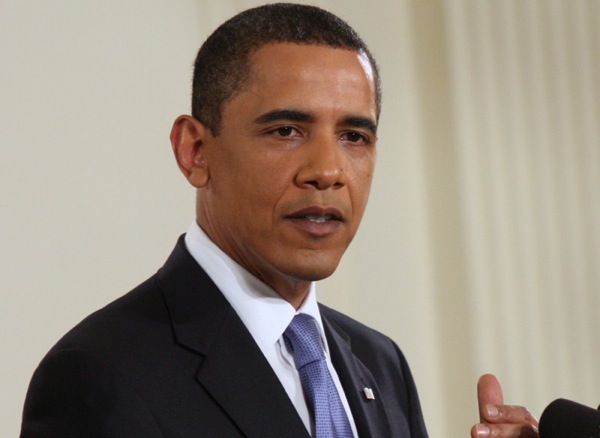Terror Case May Force Obama’s Hand on ‘State Secrets’
A long-awaited filing Thursday in the al-Haramain case presents a dare to the Obama administration.
Jul 31, 20204.2K Shares708.8K Views
President Barack Obama (WDCpix)
A long-awaited filing Thursday in the al-Haramain v. Bushterrorism case before a San Francisco federal judge presents a dare to the Obama administration: embrace the Bush administration’s warrantless surveillance claims, invoke a secrecy doctrine that Attorney General Eric Holder has pledged to overhaul, or allow a case challenging the merits of warrantless surveillance to win.
Lawyers for al-Haramain, a Muslim charity that the Bush administration accused of having links to terrorists, filed a motion Thursday for U.S. District Judge Vaughn Walker to assess the legality of surveillance undertaken outside the boundaries of the Foreign Intelligence Surveillance Act. The motion, obtained by TWI, asks Walker to answer a question central to the Bush administration’s expansion of executive authority: “May the President disregard the requirements of FISA based on inherent presidential power?”
Illustration by: Matt Mahurin
Other lawsuits challenging the warrantless surveillance program of the Bush administration have been rejected by the courts, including by Walker, for insufficiently establishing that the plaintiffs were themselves subject to such surveillance — making the al-Haramainfiling the most likely vehicle for determining whether the Bush administration broke the law by ordering surveillance outside of the boundaries of FISA.
“This is the culmination of three and a half years of work, over repeated attempts by the government” to shut the case down, said Jon Eisenberg, the lead attorney for al-Haramain. “There have been shenanigans by the Bush Justice Department, which were no surprise, but also by the Obama Justice Department, which has been a shock.”
In March, lawyers for the Obama administration followed its predecessor’s lead in the al-Haramaincase, attempting to void the proceedingsby invoking the “state secrets” privilege, which instructs judges to stop court proceedings because of potential national security concerns created by the airing of sensitive information. The original basis for al-Haramain’s case is a classified phone surveillance log that the government accidentally disclosed to al-Haramain’s lawyers and has since been recovered by the FBI. But Walker allowed the case to go forwardafter al-Haramain’s lawyers constructed a case using non-classified information — making no use of the so-called “Secret Document” — indicating that the Oregon-based charity was subject to surveillance.
With procedural obstacles cleared, the 41-page motion filed Thursday argues that the publicly available evidence demonstrates that al-Haramain was subject to illegal surveillance. “All you have to do is show me a FISA warrant and I’m gone,” Eisenberg said. More broadly, the motion asks Walker to rule on whether the Bush administration’s circumvention of the FISA statute for its passel of surveillance activities known as the Terrorist Surveillance Program was legal. “The time has come for this Court to address … the overarching constitutional question presented by President George W. Bush’s program of warrantless electronic surveillance,” the motion states. “May the President of the United States break the law in the name of national security?”
The Justice Department did not respond to questions about whether it would contest the al-Haramainmotion, and if so, what arguments it would use to oppose it. In the past, Walker has rejected the Justice Department’s claims that even ruling that al-Haramain has the standing to sue would endanger state secrets, and he may do so again. But if the administration seeks to shut the case down using the state secrets privilege, it may antagonize the Senate, where Sens. Patrick Leahy (D-Vt.) and Arlen Specter (D-Pa.) have proposed legislation to restrain the government’s ability to invoke the privilege. Holder last month promisedsenators that the Justice Department would soon issue a new state secrets policy.
Eisenberg said he is curious to see whether the Obama administration would actually defend the warrantless surveillance activities of its predecessor. The motion seeks to put the administration in a bind by citing numerous statements from senior officials denouncing the Terrorist Surveillance Program as illegal and the constitutional arguments for it to be dubious.
“Warrantless surveillance of American citizens, in defiance of FISA, is unlawful and unconstitutional,” the motion quotes then-Senator Obama telling the Boston Globe in December 2007. Similar statements recounted in the motion come from Holder; Solicitor General Elana Kagan; Kagan’s deputy Neal Katyal; Assistant Attorney General David Kris; and Associate Deputy Attorney General Donald Verrilli.
“What does Obama do?” Eisenberg said. “This is not just a question of hypocrisy. It’s a big constitutional mistake if he endorses [former Vice President Dick] Cheney’s theory of executive power.”
A full court hearing before Walker is scheduled for Sept. 1.

Hajra Shannon
Reviewer
Latest Articles
Popular Articles

